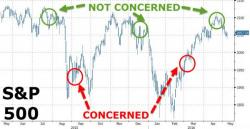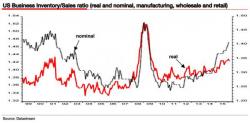When Is The Fed "Concerned" And When Isn't It: Find Out With This Handy Chart

In a recent interview with CNBC's Rick Santelli, Richard Fisher, former President of the Dallas Fed, explained “The Fed has the market on Ritalin—trying to keep the mood very smooth, keep volatility down as much as possible. As soon as they hint that they might remove that, then they create the problems they're afraid of. So, they've boxed themselves into a corner, and the real art will be to see how they manoeuvre to get out of that”….“When [the Fed] move—and I hope they move sometime in June—there'll be a settling in of the marketplace. There will be a correction. Suck it up.



